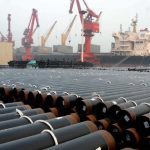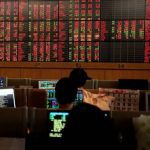China‘s manufacturing sector continued to expand in April, with its purchasing managers’ index (PMI) reaching 51.2 percent in April, though at a slower pace, according to China Federation of Logistic and Purchasing and China National Bureau of Statistics on Sunday.
Although the index in April slightly fell 0.6 percentage point from March, it is still in the expansion range.
“The PMI in April, in general, reflects that the Chinese economy keeps a steady growth in the range, reaching 51.2 percent. Although it fells, it shows a kind of structural adjustment,” said Cai Jin, vice president of China Federation of Logistic and Purchasing.
It was learned that the falls of the PMI mainly was affected by the essential raw material sector, especially the high energy-consuming industry, which had a dramatic decline.
Apart from the fall, the PMI rose steadily in the equipment manufacturing industry and consumable industry, and it kept a relatively high level in the high technology industries. From the point of view of business operation, the PMI in small enterprises showed a significant rebound.
“Most enterprises are still in the expansion range through investigation. The PMI of the small enterprises rose for two consecutive months, including April, reaching 50 percent. The producing and operating status of the small enterprises will get much better,” said Zhao Qinghe, senior NBS statistician of the service sector.
A PMI reading above 50 indicates an expansion, while one below 50 points a contraction.
China‘s manufacturing sector continued to expand in April, with its purchasing managers’ index (PMI) reaching 51.2 percent in April, though at a slower pace, according to China Federation of Logistic and Purchasing and China National Bureau of Statistics on Sunday.
Although the index in April slightly fell 0.6 percentage point from March, it is still in the expansion range.
“The PMI in April, in general, reflects that the Chinese economy keeps a steady growth in the range, reaching 51.2 percent. Although it fells, it shows a kind of structural adjustment,” said Cai Jin, vice president of China Federation of Logistic and Purchasing.
It was learned that the falls of the PMI mainly was affected by the essential raw material sector, especially the high energy-consuming industry, which had a dramatic decline.
Apart from the fall, the PMI rose steadily in the equipment manufacturing industry and consumable industry, and it kept a relatively high level in the high technology industries. From the point of view of business operation, the PMI in small enterprises showed a significant rebound.
“Most enterprises are still in the expansion range through investigation. The PMI of the small enterprises rose for two consecutive months, including April, reaching 50 percent. The producing and operating status of the small enterprises will get much better,” said Zhao Qinghe, senior NBS statistician of the service sector.
A PMI reading above 50 indicates an expansion, while one below 50 points a contraction.
China‘s manufacturing sector continued to expand in April, with its purchasing managers’ index (PMI) reaching 51.2 percent in April, though at a slower pace, according to China Federation of Logistic and Purchasing and China National Bureau of Statistics on Sunday.
Although the index in April slightly fell 0.6 percentage point from March, it is still in the expansion range.
“The PMI in April, in general, reflects that the Chinese economy keeps a steady growth in the range, reaching 51.2 percent. Although it fells, it shows a kind of structural adjustment,” said Cai Jin, vice president of China Federation of Logistic and Purchasing.
It was learned that the falls of the PMI mainly was affected by the essential raw material sector, especially the high energy-consuming industry, which had a dramatic decline.
Apart from the fall, the PMI rose steadily in the equipment manufacturing industry and consumable industry, and it kept a relatively high level in the high technology industries. From the point of view of business operation, the PMI in small enterprises showed a significant rebound.
“Most enterprises are still in the expansion range through investigation. The PMI of the small enterprises rose for two consecutive months, including April, reaching 50 percent. The producing and operating status of the small enterprises will get much better,” said Zhao Qinghe, senior NBS statistician of the service sector.
A PMI reading above 50 indicates an expansion, while one below 50 points a contraction.
China‘s manufacturing sector continued to expand in April, with its purchasing managers’ index (PMI) reaching 51.2 percent in April, though at a slower pace, according to China Federation of Logistic and Purchasing and China National Bureau of Statistics on Sunday.
Although the index in April slightly fell 0.6 percentage point from March, it is still in the expansion range.
“The PMI in April, in general, reflects that the Chinese economy keeps a steady growth in the range, reaching 51.2 percent. Although it fells, it shows a kind of structural adjustment,” said Cai Jin, vice president of China Federation of Logistic and Purchasing.
It was learned that the falls of the PMI mainly was affected by the essential raw material sector, especially the high energy-consuming industry, which had a dramatic decline.
Apart from the fall, the PMI rose steadily in the equipment manufacturing industry and consumable industry, and it kept a relatively high level in the high technology industries. From the point of view of business operation, the PMI in small enterprises showed a significant rebound.
“Most enterprises are still in the expansion range through investigation. The PMI of the small enterprises rose for two consecutive months, including April, reaching 50 percent. The producing and operating status of the small enterprises will get much better,” said Zhao Qinghe, senior NBS statistician of the service sector.
A PMI reading above 50 indicates an expansion, while one below 50 points a contraction.
China‘s manufacturing sector continued to expand in April, with its purchasing managers’ index (PMI) reaching 51.2 percent in April, though at a slower pace, according to China Federation of Logistic and Purchasing and China National Bureau of Statistics on Sunday.
Although the index in April slightly fell 0.6 percentage point from March, it is still in the expansion range.
“The PMI in April, in general, reflects that the Chinese economy keeps a steady growth in the range, reaching 51.2 percent. Although it fells, it shows a kind of structural adjustment,” said Cai Jin, vice president of China Federation of Logistic and Purchasing.
It was learned that the falls of the PMI mainly was affected by the essential raw material sector, especially the high energy-consuming industry, which had a dramatic decline.
Apart from the fall, the PMI rose steadily in the equipment manufacturing industry and consumable industry, and it kept a relatively high level in the high technology industries. From the point of view of business operation, the PMI in small enterprises showed a significant rebound.
“Most enterprises are still in the expansion range through investigation. The PMI of the small enterprises rose for two consecutive months, including April, reaching 50 percent. The producing and operating status of the small enterprises will get much better,” said Zhao Qinghe, senior NBS statistician of the service sector.
A PMI reading above 50 indicates an expansion, while one below 50 points a contraction.
China‘s manufacturing sector continued to expand in April, with its purchasing managers’ index (PMI) reaching 51.2 percent in April, though at a slower pace, according to China Federation of Logistic and Purchasing and China National Bureau of Statistics on Sunday.
Although the index in April slightly fell 0.6 percentage point from March, it is still in the expansion range.
“The PMI in April, in general, reflects that the Chinese economy keeps a steady growth in the range, reaching 51.2 percent. Although it fells, it shows a kind of structural adjustment,” said Cai Jin, vice president of China Federation of Logistic and Purchasing.
It was learned that the falls of the PMI mainly was affected by the essential raw material sector, especially the high energy-consuming industry, which had a dramatic decline.
Apart from the fall, the PMI rose steadily in the equipment manufacturing industry and consumable industry, and it kept a relatively high level in the high technology industries. From the point of view of business operation, the PMI in small enterprises showed a significant rebound.
“Most enterprises are still in the expansion range through investigation. The PMI of the small enterprises rose for two consecutive months, including April, reaching 50 percent. The producing and operating status of the small enterprises will get much better,” said Zhao Qinghe, senior NBS statistician of the service sector.
A PMI reading above 50 indicates an expansion, while one below 50 points a contraction.
China‘s manufacturing sector continued to expand in April, with its purchasing managers’ index (PMI) reaching 51.2 percent in April, though at a slower pace, according to China Federation of Logistic and Purchasing and China National Bureau of Statistics on Sunday.
Although the index in April slightly fell 0.6 percentage point from March, it is still in the expansion range.
“The PMI in April, in general, reflects that the Chinese economy keeps a steady growth in the range, reaching 51.2 percent. Although it fells, it shows a kind of structural adjustment,” said Cai Jin, vice president of China Federation of Logistic and Purchasing.
It was learned that the falls of the PMI mainly was affected by the essential raw material sector, especially the high energy-consuming industry, which had a dramatic decline.
Apart from the fall, the PMI rose steadily in the equipment manufacturing industry and consumable industry, and it kept a relatively high level in the high technology industries. From the point of view of business operation, the PMI in small enterprises showed a significant rebound.
“Most enterprises are still in the expansion range through investigation. The PMI of the small enterprises rose for two consecutive months, including April, reaching 50 percent. The producing and operating status of the small enterprises will get much better,” said Zhao Qinghe, senior NBS statistician of the service sector.
A PMI reading above 50 indicates an expansion, while one below 50 points a contraction.
China‘s manufacturing sector continued to expand in April, with its purchasing managers’ index (PMI) reaching 51.2 percent in April, though at a slower pace, according to China Federation of Logistic and Purchasing and China National Bureau of Statistics on Sunday.
Although the index in April slightly fell 0.6 percentage point from March, it is still in the expansion range.
“The PMI in April, in general, reflects that the Chinese economy keeps a steady growth in the range, reaching 51.2 percent. Although it fells, it shows a kind of structural adjustment,” said Cai Jin, vice president of China Federation of Logistic and Purchasing.
It was learned that the falls of the PMI mainly was affected by the essential raw material sector, especially the high energy-consuming industry, which had a dramatic decline.
Apart from the fall, the PMI rose steadily in the equipment manufacturing industry and consumable industry, and it kept a relatively high level in the high technology industries. From the point of view of business operation, the PMI in small enterprises showed a significant rebound.
“Most enterprises are still in the expansion range through investigation. The PMI of the small enterprises rose for two consecutive months, including April, reaching 50 percent. The producing and operating status of the small enterprises will get much better,” said Zhao Qinghe, senior NBS statistician of the service sector.
A PMI reading above 50 indicates an expansion, while one below 50 points a contraction.










